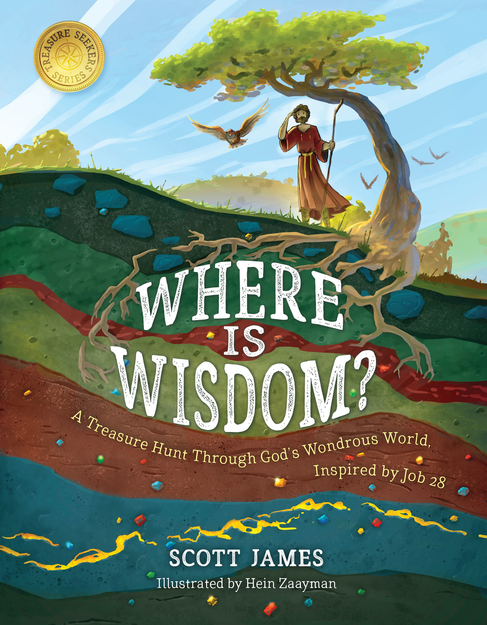A Delightful Picture Book Inspired by Job 28
NKJV translators call Job 28 “Job’s Discourse on Wisdom” and it’s a hidden Old Testament gem for sure. Buried in the heart of Job’s final defense to his so-called “friends,” this chapter entices us to pursue wisdom by portraying it as a precious and elusive treasure that we may only receive by “the fear of the Lord” (v. 28). The chapter flows as follows:
- We can’t mine wisdom. (28:1-11)
- We can’t find wisdom. (28:12-14)
- We can’t purchase wisdom. (28:15-19)
- We can’t discover wisdom. (28:20-22)
- Wisdom comes from God. (28:23-28)
If parents and Sunday School teachers are unfamiliar with this passage, then our children are unfamiliar too. Thankfully, Scott James (text) and Hein Zaayman (artwork) help remedy this problem by renewing our interest and awareness with this hardcover, nicely bound picture book called Where is Wisdom? A Treasure Hunt Through God’s Wondrous World.
This delightful, 32-pg. presentation is not a loose translation of the biblical passage, nor is it a paraphrase. It’s a colorful, artful adaptation that explores the questions, themes, and flow of the biblical chapter freely. There’s only a small bit of text on each page, so you can finish the book in 10 minutes or less, no problem. To receive the full impact though, you should pause to soak in the artwork before turning each page (something you’ll do only 14 times).
This book will encourage you to read Job 28 with fresh new eyes, just as it did for me and I’m a grown-up!
This book will encourage you to read Job 28 with fresh new eyes, just as it did for me and I’m a grown-up! More than once, I’ve also caught my 6-year-old son reading the book with rapt attention, voicing comments and asking questions along the way. (The sea-monster drawing is enchanting, especially for little boys.)
B&H Publishing markets this book for children preschool to 3rd grade, but the vocabulary and style tilt towards 3rd grade and older, not preschool. The main reason for this, however, may be the abstract nature of the subject, as wisdom is a difficult concept for young children to comprehend, and so is the fear of the Lord.
Like Job 28, this book doesn’t give an explicit definition of wisdom, though we learn that it’s found in the fear of the Lord, which James describes near the end of the book as “to know God truly, to be amazed by his greatness, to want nothing more than to love and live for him.” Though he doesn’t mention “turning away from evil” as the end of Job 28 does, James features a valuable reference on the last two pages to the “greater treasure,” Jesus Christ. A final page offers parents insights to help them “read” Job 28 in the Bible with their child(ren), and it also lists five questions to “think” about its significance, suggesting gospel insights from the New Testament book of Colossians.
This book makes an excellent gift for middle-aged elementary children, a nice resource for Sunday School teachers to read to their class once a year, and a good book for grandparents to leave lying around the living room or for parents to use for family devotions. As a children’s book, I give it 4.5 stars. It’s not Max Lucado, but it’s close.
Thanks to B&H Publishing for providing me with a copy of this book. This did not influence the outcome of my review.


